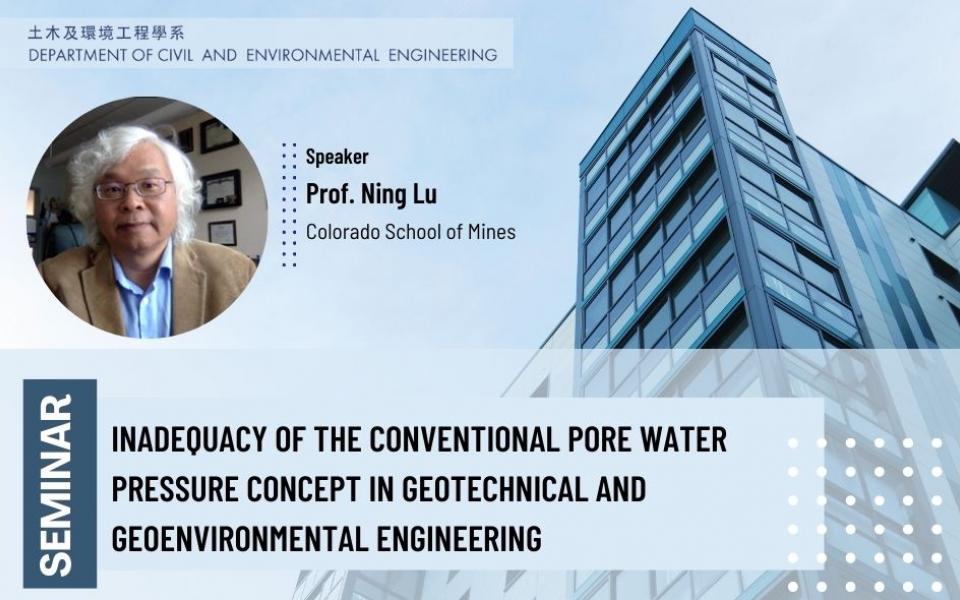Civil Engineering Departmental Seminar - - Inadequacy of the Conventional Pore Water Pressure Concept in Geotechnical and Geoenvironmental Engineering
Supporting the below United Nations Sustainable Development Goals:支持以下聯合國可持續發展目標:支持以下联合国可持续发展目标:
Inadequacy of the Conventional Pore Water Pressure Concept in Geotechnical and Geoenvironmental Engineering
The conventional pore water pressure concept is a cornerstone in soil mechanics and has been almost universally applied to applications in geotechnical and geoenvironmental engineering. Conventional pore water pressure is an average pressure on a scale greater than millimeters and is commonly measured by piezometric head under saturated soil conditions and tensiometric head under unsaturated soil conditions. The underlying assumption to use the pore water pressure as a state variable in both theoretical formulations. Soil water interactions in some soils are driven by electromagnetic forces originating in the soil solid, leading to highly localized pressure variation or inter-water molecular pressure within a single pore. The soil water experiencing locally elevated pore water pressure is called adsorptive water. The local pore water pressure is in variably very high near the particle surface or within interlamellar layers, typically up to 800 MPa or even 1.6 GPa. This is the case whether a soil is in saturated or unsaturated state, or whether the soil is pure sand or bentonite clay. This is due to the existence of soil sorptive potential, a synthesized electromagnetic potential that includes van der Waals, electric double layer, surface hydration, and cation hydration components. However, the spatial extent of the influenced zone or the amount of adsorptive water is highly dependent on soil’s specific surface area, cation exchange capacity, and pore fluid chemistry.
Like the conventional pore water pressure, the locally highly variable pore water pressure will control many macroscopic soil properties and engineering behaviors. Using some recent experimental data, the presenter demonstrates that the local pore water pressure will determine soil water density, small-strain shear modulus, soil water freezing curve, elastic modulus, and thermal conductivity. Therefore, the conventional definition of the pore water pressure is inadequate in describing many commonly encountered physical phenomena in soil such as water phase transitions, coupled flows, and effective stress. To demonstrate the importance of the need for a more general pore water pressure definition, the presenter highlights recent developments in a general pore water pressure definition to characterize soil properties of soil water characteristic curve, soil freezing curve, elastic modulus, and thermal conductivity function. The presenter argue that the conventional pore water pressure is inadequate for describing many emerging challenges related to pore water pressure. It is imperative to develop and use a more general definition of the pore water pressure for developing better theories and seeking better engineering solutions to problems in geotechnical and geoenvironmental engineering.
Prof. Ning Lu has been working on fundamental concepts of effective stress and soil water potential (suction) in the past two decades and made some breakthroughs. He has unified soil’s effective stress under both saturated and unsaturated conditions, moving beyond the classical Terzaghi’s and Bishop’s effective stress representations. He is the recipient of the ASCE 2023 Karl van Terzaghi Award. For his seminal work on unification of effective stress, he received American Society of Civil Engineers (ASCE) Norman Medal twice; first in 2007 for conceptualization of suction stress, and second in 2021 for formulation of a practical closed form effective stress equation. He further defines a general thermodynamics-based pore water potential in soil under both saturated and unsaturated conditions. In the past two decades, he has formulated a new paradigm for slope stability under variably saturated conditions, which has been bestowed by ASCE for its 2017 R. B. Peck Award, and M. A. Biot Medal. He is a fellow of ASCE, Geological Society of America, and Engineering Mechanics Institute. He has published two widely used textbooks: Unsaturated Soil Mechanics (Lu and Likos, 2004, John Wiley and Sons), and Hillslope Hydrology and Stability (Lu and Godt, 2013, Cambridge University Press).
